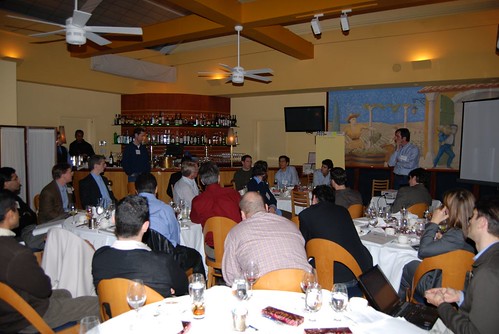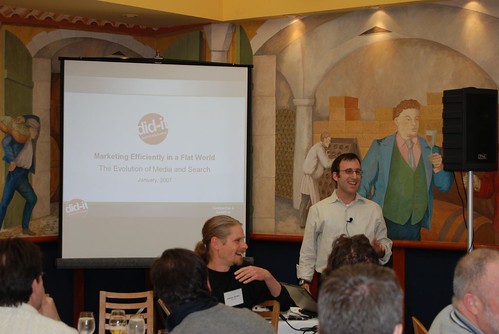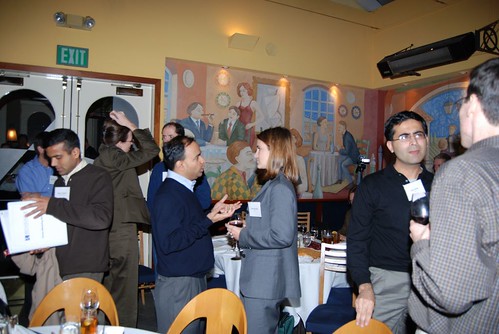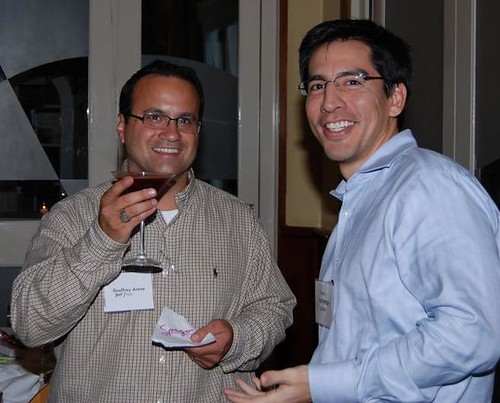"People who demand neutrality in any situation are usually not neutral but in favor of the status quo." -- Max Eastman
Andy asked me in the comments of my last post about net neutrality--what is it really and who cares?
 The Internet Protocol treats all packets equally, but there are various reasons why someone might want a "fast lane" for packets. Content publishers and VOIP carriers deliver media streams whose packets expire if they arrive late. E-commerce vendors lose money when impatient shoppers abandon carts due to router congestion caused by all those media streams. So demand grows for express services, and a number of technology vendors, ranging from startups to Cisco, increasingly offer ISPs technologies for delivering them.
The Internet Protocol treats all packets equally, but there are various reasons why someone might want a "fast lane" for packets. Content publishers and VOIP carriers deliver media streams whose packets expire if they arrive late. E-commerce vendors lose money when impatient shoppers abandon carts due to router congestion caused by all those media streams. So demand grows for express services, and a number of technology vendors, ranging from startups to Cisco, increasingly offer ISPs technologies for delivering them.
Net neutrality arose from a concern that these new services would change the nature of the internet. Privatize the highways, people worry, and only the wealthy will drive. Rich incumbents will control the pipes, while innovative challengers must compete for the scraps of spare bandwidth. Proponents of net neutrality would therefore impose regulation on tier one ISP's so that they cannot deliver any services that discriminate among packets. (Readers of Kurt Vonnegut, Jr. will recognize this line of thinking from his story Harrison Bergeron in Welcome to the Monkeyhouse.) 
The call for net neutrality is superficially appealing, in the same way that it's easy to oppose free trade in defense of your countrymen's jobs. But just like regulating imports, regulating ISPs with rules on net neutrality is short-sighted and, in the long term, terrible for both businesses and consumers. It's politically incorrect to say so, it's likely to get me flamed, and Google won't like me for saying it, but it's true.
Market forces will, as they always have, drive innovation on the internet. ISPs will find ways to accelerate and guarantee delivery with all sorts of interesting new services, and businesses who can deliver more value to their consumers through better internet performance can afford to pay for them. Should Fedex have been prohibited from competing against the Post Office, so that "big corproations" wouldn't have an advantage over the little guy? Of course not.
Proponents of net neutrality would counter that Fedex doesn't hurt the performance of old-fashioned mail, while express lanes for packets will necessarily slow down "free packets" pushed to the back of the line. On the contrary: allowing ISPs to profit from delivering express services for special classes of traffic will directly lead to the rapid development of additional internet capacity. There is no limit to the number of lanes one can build on the information highway, unless of course you regulate and cripple the only entities capable of building those lanes. 
So far, this may sound like a reasonable technical issue to debate. But the campaign for net neutrality has transcended logic, manuevering instead to prevail upon Congress with an emotional appeal to the voters. "If we are silent, if we don't stand up for Internet Freedom," warns Hollywood star Alyssa Milano, "corporations will take away our right to choose!" As always, it's easy and popular to demonize corporations.
In his letter to the public (a great PR play, and a nice pander to regulators who look for reasons to work), Eric Schmidt wrote that net neutrality is needed to prevent broadband carriers from controlling what people say or do online. As I have blogged before, Eric is certainly a genius (I can pander, too), but this call to fear is wrong on so many levels, not to mention egregiously hypocritical. (Remember China?)
For one thing, accelerating a stream of packets, even at the mythical expense of some random packets, does not "control what people do online." Also, ISPs are not public utilities; they are businesses whose owners--including individual investors and pension funds--have no legal obligation to amuse Eric with whatever internet sites he craves. (Should AOL and the mobile environments of AT&T and Verizon be legally forced to provide access to outside content?) Having said both those things, the market will not reward ISPs who effectively block or even slow access to the full array of web sites--there is demand for express traffic and free traffic, so both sevices should and would exist.
Finally, it isn't simple to decide what kinds of acceleration services count as neutral. Is Akamai style acceleration neutral? What about Netli style wormholes? What about monitoring services? Okay it's easy to say these don't count. Now what about treating video streams differently on an unpaid basis, to enhance customer satisfaction and better control traffic flows? What about building out IMS networks with ENUM servers for quality VOIP? How about blocking access to sites that are pornographic, violent, hateful, illegal (casinos), or ridden with viruses? What about selling IP service that can withstand DOS attacks? What about simply selling higher quality service plans that give more bursty bandwidth when needed? Who will authoritatively model the complexities that emerge to determine whether these upgrades are good or bad for overall network performance--Alyssa Milano??
 Engineers have done pretty well so far building the internet without regulatory oversight. If we now erect a glorious bureaucracy of regulators who painstakingly review every upgrade to a broadband carrier, the one thing I am sure of is that US carriers will immediately lose market share to their competitors. The state of the U.S. internet backbone itself will freeze both in capacity and technology as the rest of the planet leapfrogs our creaky, petrified infrastructure.
Engineers have done pretty well so far building the internet without regulatory oversight. If we now erect a glorious bureaucracy of regulators who painstakingly review every upgrade to a broadband carrier, the one thing I am sure of is that US carriers will immediately lose market share to their competitors. The state of the U.S. internet backbone itself will freeze both in capacity and technology as the rest of the planet leapfrogs our creaky, petrified infrastructure.
"The Constitution is not neutral. It was designed to take the government off the backs of people." -- William Orville Douglas
netneutrality ISP Vonnegut ericschmidt google maxeastman net-neutrality
Blogged with Flock
 If you're the family IT guy, I recommend you install a Yoggie Gatekeeper. This credit-card-sized gizmo (designed for mobile protection of road warrior laptops) can be inserted between your router and LAN switch to protect all downstream PCs in your home from just about any kind of attack. You don't have to install security software at each PC, and you can set the security settings for each PC centrally, so your 7-year old can't bypass the filters (don't get me started). By vesting the security functions in a separate processor the way that enterprises do, your network is much safer from exploits (in fact Yoggie won the Innovation Station competition at RSA this year). But more importantly, the out-of-box experience is iPod-like, and the whole installation takes less than 5 minutes unless you gawk for too long.
If you're the family IT guy, I recommend you install a Yoggie Gatekeeper. This credit-card-sized gizmo (designed for mobile protection of road warrior laptops) can be inserted between your router and LAN switch to protect all downstream PCs in your home from just about any kind of attack. You don't have to install security software at each PC, and you can set the security settings for each PC centrally, so your 7-year old can't bypass the filters (don't get me started). By vesting the security functions in a separate processor the way that enterprises do, your network is much safer from exploits (in fact Yoggie won the Innovation Station competition at RSA this year). But more importantly, the out-of-box experience is iPod-like, and the whole installation takes less than 5 minutes unless you gawk for too long.






 The Internet Protocol treats all packets equally, but there are various reasons why someone might want a "fast lane" for packets. Content publishers and VOIP carriers deliver media streams whose packets expire if they arrive late. E-commerce vendors lose money when impatient shoppers abandon carts due to router congestion caused by all those media streams. So demand grows for express services, and a number of technology vendors, ranging from startups to Cisco, increasingly offer ISPs technologies for delivering them.
The Internet Protocol treats all packets equally, but there are various reasons why someone might want a "fast lane" for packets. Content publishers and VOIP carriers deliver media streams whose packets expire if they arrive late. E-commerce vendors lose money when impatient shoppers abandon carts due to router congestion caused by all those media streams. So demand grows for express services, and a number of technology vendors, ranging from startups to Cisco, increasingly offer ISPs technologies for delivering them.

 Engineers have done pretty well so far building the internet without regulatory oversight. If we now erect a glorious bureaucracy of regulators who painstakingly review every upgrade to a broadband carrier, the one thing I am sure of is that US carriers will immediately lose market share to their competitors. The state of the U.S. internet backbone itself will freeze both in capacity and technology as the rest of the planet leapfrogs our creaky, petrified infrastructure.
Engineers have done pretty well so far building the internet without regulatory oversight. If we now erect a glorious bureaucracy of regulators who painstakingly review every upgrade to a broadband carrier, the one thing I am sure of is that US carriers will immediately lose market share to their competitors. The state of the U.S. internet backbone itself will freeze both in capacity and technology as the rest of the planet leapfrogs our creaky, petrified infrastructure. 
 We also set aside some time for best-of-class (non-Bessemer) vendors to present (videos
We also set aside some time for best-of-class (non-Bessemer) vendors to present (videos 

